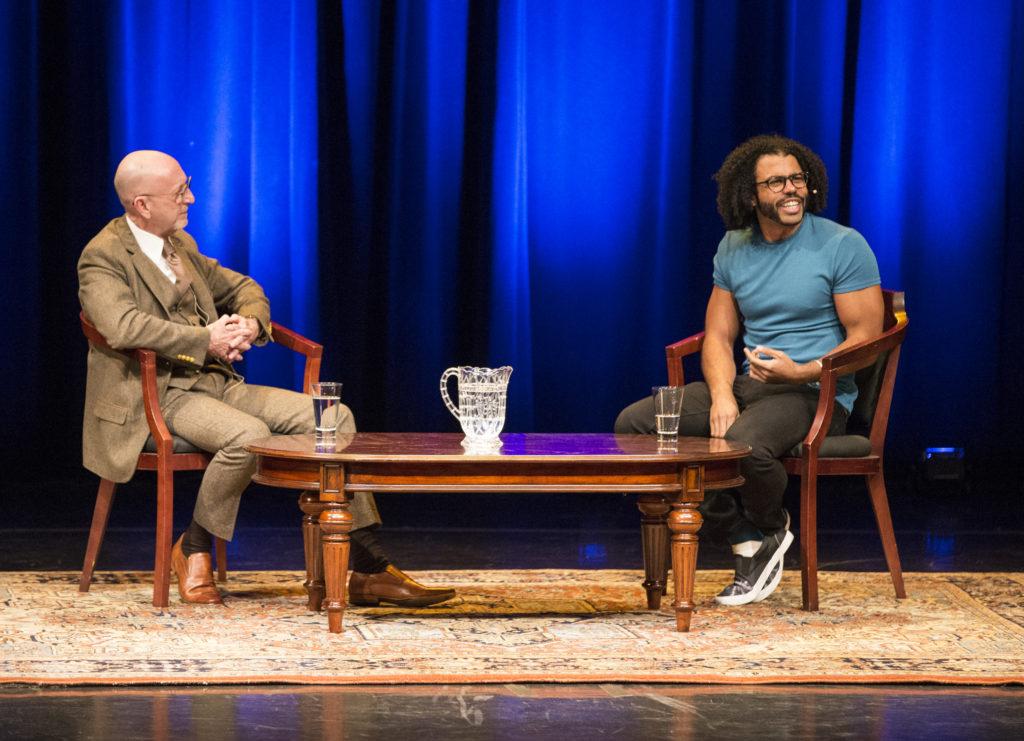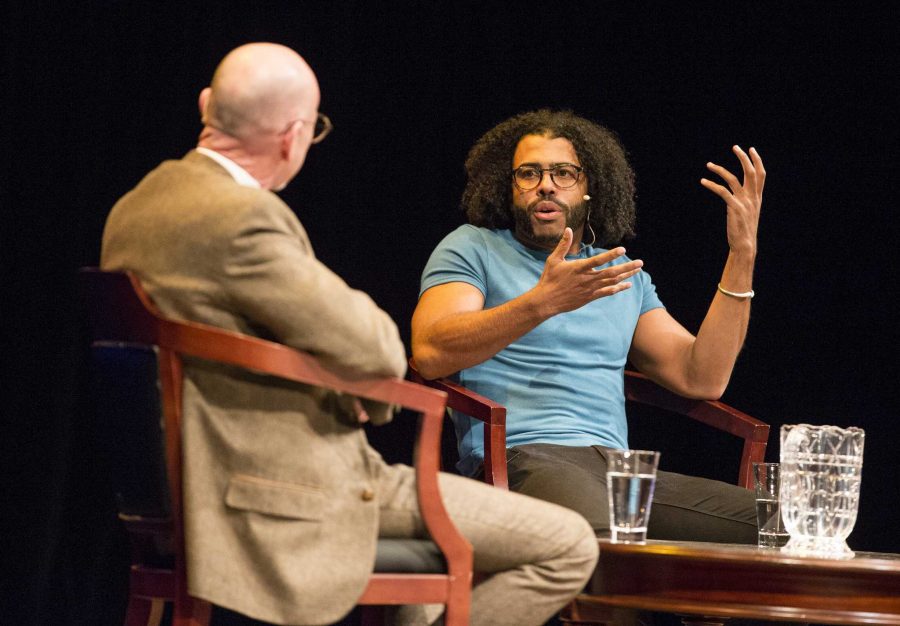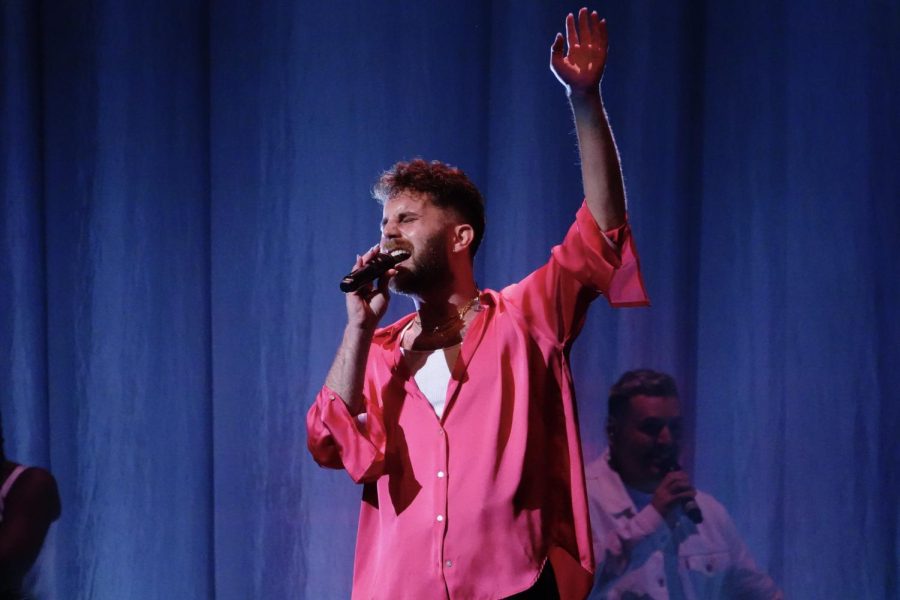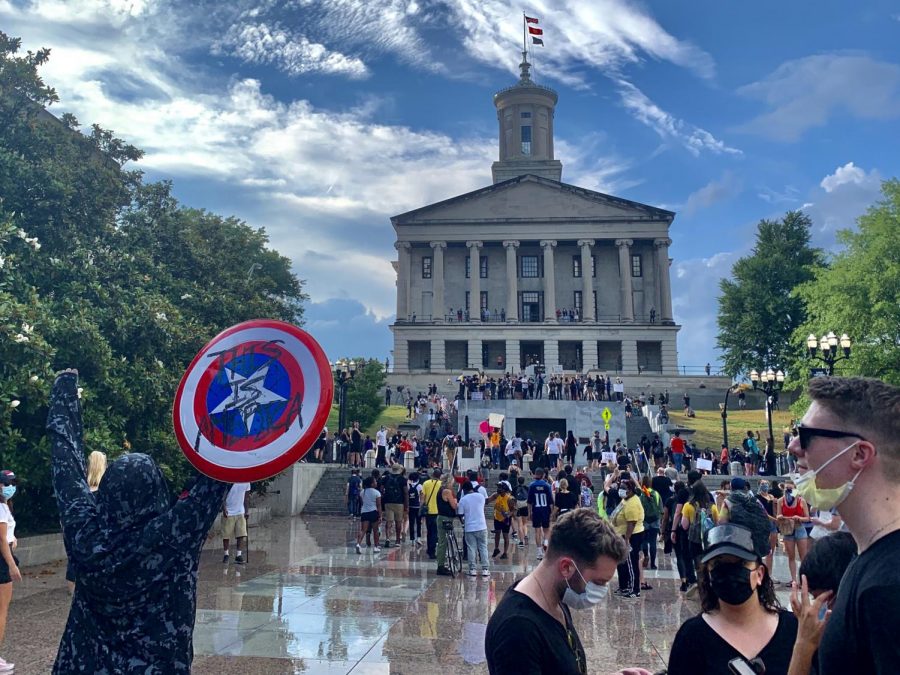While Vanderbilt’s campus dealt with the fallout of the election on Wednesday night, Daveed Diggs—star of the monumental Broadway musical Hamilton—spoke to a nearly sold out Langford Auditorium. During the one-hour discussion, Diggs, who won a Tony Award for his portrayal of both Marquis de Lafayette and Thomas Jefferson, covered topics from the rise of Hamilton to the election results to the new album from his hip-hop group, clipping.
The evening, entitled “Hamilton: Politics and Broadway,” began with a discussion between Chancellor Nicholas Zeppos and Professor Alice Randall. Randall, who is a screenwriter, songwriter and writer-in-residence in the African American and Diaspora Studies department—drew connections between Alexander Hamilton and the current election. She said that like Hamilton, the nation must find a way to “integrate head and heart together.” Randall ended the first discussion arm-in-arm with Chancellor Zeppos, reciting (largely from memory) Langston Hughes’s poem “Mother to Son,” which she dubbed “Professor to Student.”
After a short intermission, Diggs strode onto the stage to uproarious applause. He took his seat aside a wooden coffee table and across from Professor Jim Lovenshimer, faculty head of Moore College and moderator of the night’s discussion.
The discussion began with Diggs commenting on Hamilton’s rise from Broadway-insider gossip to cultural phenomenon. The actor shared memories from the early days of Hamilton. He revealed that his double-time section in “Washington on Your Side” was a spur of the moment curiosity pitched by star and creator Lin-Manuel Miranda on the day of a show, just one example of how the cast’s excitement about the project helped to continuously improve.
“We’d leave [the theater], go to a bar, and still be talking about it,” Diggs said.

But it wasn’t long before Diggs saw the musical move beyond a jewel known only to cast, crew and Broadway insiders. Diggs joked about the transition to fame—hearing people shout his name on the subway and have fans randomly rap Hamilton lyrics at him around the city.
“I didn’t care about Broadway and I wasn’t going to go there,” Diggs said of Hamilton’s unprecedented popularity. “As far as I figured, every show was like this.”
Diggs began his post-college career as a teacher, instructing kids in the Bay Area about rap and hip-hop.
One theme of the evening was the way in which Hamilton—a show that seamlessly incorporates rap and hip-hop into musical theater—will inspire and perhaps help redefine the genre.
Diggs—in true educator form—shared that the most meaningful part of his Hamilton experience was afternoon matinees that brought many young, teenage rappers to Broadway.
Grinning, Diggs reminisced about how the cast and crew brought in local New York students to the Richard Rogers Theatre to perform their own raps about moments in history. He noted with great admiration that many young MC’s told their stories in such modern hip-hop styles that it would have even been “too current for most audiences to get.”
Diggs was quick to note that when he was younger, Broadway was not a destination on his mind.
“I never thought there was a place for me there,” he said.
The actor expressed hope that the popularity and commercial success of Hamilton, especially among young fans and playwrights, will inspire more plays with roles for actors of colors. He also toyed with the likelihood of even seeing more gender fluid casting in future productions of the musical.
Before eventually finding his way to Broadway, Diggs gained some notoriety from clipping., his experimental hip-hop group singed to Seattle’s Sub-Pop Records. During audience Q&A’s, Diggs smiled as he discussed the afro-futuristic storyline of the group’s most recent concept album, Splendor and Misery.
At one point, the audience even coaxed him into rapping, although Diggs refused to humor the crowd with any Jefferson of Lafayette verses.
“That’s not my job anymore,” he said with a smile.
With the election hanging over everyone’s minds and working its way into many of the audience questions, Diggs did find himself filling the job of political pundit, a role he embraced with genuine and thoughtful responses.
In the wake of the election, Diggs looked to Hamilton’s message—one of optimism, when discussing the country’s divisiveness that he admittedly underestimated.
He expressed regret over a pro-Hillary PSA that he recorded in the days leading up to Nov. 8. Despite his firm support for Secretary Clinton, Diggs apprehension to the video stems from a worry that he ignored the “real feelings” people were having and that his pro-con comparison of the candidate’s policies confirmed the decisiveness tendencies that characterized the electorate. Instead, Diggs urged students to talk and listen to one another.
In that vein, the conversation returned to art, specifically Hamilton, and the way in which the play’s popularity and political relevance left its viewers in an interesting position.
“Everyone [in cast and audience] is imagining the start of the country in a time where the country’s more divided than ever,” he said.
“What Hamilton really says,” Diggs told to the crowd, “is that you aren’t going to be happy with everything that happens. But, if you participate, it works.”




